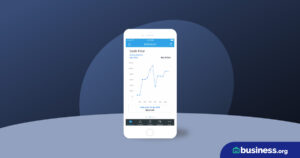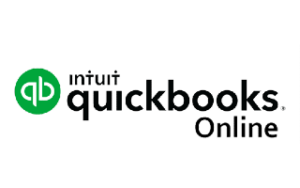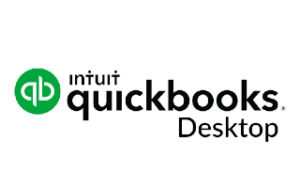💸 See if your business qualifies for a tax credit worth up to $26k per employee. 📞 Call Now: 855-979-9597
QuickBooks Online vs. QuickBooks Desktop 2023
Data as of 8/3/22. Offers and availability may vary by location and are subject to change.
We are committed to sharing unbiased reviews. Some of the links on our site are from our partners who compensate us. Read our editorial guidelines and advertising disclosure.
QuickBooks Online and QuickBooks Desktop are two solid accounting products from Intuit. While both software types have plenty of perks, QuickBooks Online is a more flexible, affordable, and scalable option for most small-business owners. (Intuit itself encourages customers to switch from QuickBooks Desktop to QuickBooks Online.) However, QuickBooks Desktop can work for bigger businesses that need industry-specific software or for small businesses with limited internet access.
QuickBooks Online vs. Desktop table of contents
QuickBooks Online and QuickBooks Desktop starting plans and prices
Data as of 8/3/22. Offers and availability may vary by location and are subject to change.
QuickBooks Online: Best for most small businesses
Data as of 8/3/22. Offers and availability may vary by location and are subject to change.
QuickBooks Online features
QuickBooks Online has been part of the Intuit accounting software family for a few decades now. Since QuickBooks Online is browser-based, not desktop-based, you can log on to your Quickbooks Online account from any web-enabled device with a sturdy internet connection.
So what can you do with your cloud-based accounting service? Plenty. QuickBooks Online’s small-business accounting plans start at $15 a month and include a slew of solid features:
- Income and expense tracking
- 1099 contractor management
- Estimates and invoicing
- Receipt scanning and organization
- Online payment acceptance
- Mileage tracking for work travel
- Integration with cloud-based third-party apps, including ecommerce apps like Shopify
QuickBooks Online’s heftier plans add midsize business–friendly features like the following:
- Bill pay
- Time and project tracking
- Inventory management
- Additional automation
- Multiple users (up to 25)
Additional customer support (including live software trainings)
QuickBooks Online pros and cons
Since QuickBooks Online offers four cloud-based plans, it easily grows with your business. As you hire more employees or bring on more customers, you can scale up your software to match. And if you manage your business from multiple locations, you’ll want QuickBooks Online over Desktop. Only QuickBooks Online includes free access to a comprehensive version of the QuickBooks mobile accounting app, which is one of the best apps in the accounting sphere.
Unfortunately, QuickBooks Online generally costs more than most other cloud-based accounting solutions: at $30 a month, its entry-level plan is $15 more than FreshBooks, $18 more than Xero, and $30 more than Zoho Books. If cost is your primary concern, we recommend looking at an accounting option other than QuickBooks.
By signing up I agree to the Terms of Use and Privacy Policy.
QuickBooks Desktop: Best for industry-specific reporting
Data as of 8/3/22. Offers and availability may vary by location and are subject to change.
QuickBooks Desktop features
Like QuickBooks Online, QuickBooks Desktop Pro Plus offers these key accounting features:
- Invoicing
- Income and expense tracking
- Sales tax tracking
Unlike QuickBooks Online, Desktop Pro includes built-in inventory management. And if data analysis is an important part of growing your business, QuickBooks Desktop is a solid pick. It includes 100+ reports, while QuickBooks Online Simple Start includes around 40. The Desktop Premier edition escalates to 150+ reports, including industry-specific reports for general contractors, manufacturers and wholesalers, nonprofits, and retailers.
QuickBooks Desktop pros and cons
QuickBooks Desktop isn’t cloud based, so you can only access it from the computer you installed the software on. That feature comes in handy if you have limited internet access, but it isn’t right for business owners who do most of their accounting on the go. The QuickBooks Desktop version of the mobile app is also incredibly limited in scope—you can use it to scan receipts only. (And for what it's worth, the app is very poorly reviewed by its very limited number of both iOS and Android users.)
We also don’t recommend QuickBooks Desktop to Mac users, since there’s just one desktop-based plan for Mac users. This plan, QuickBooks Desktop for Mac, has the same features as QuickBooks Desktop Pro Plus, the most basic desktop-based plan. In other words, Mac users can't scale up their software from one plan to the next as they add software users.
However, if you’re not a Mac user, you can choose from all three QuickBooks Desktop plans. The QuickBooks Desktop Premier Plus plan is particularly useful for business that want industry-specific features. Most notably, Premier Plus has 150+ customizable reports for nonprofits, general contractors, and retailers.
QuickBooks Online vs. Desktop pricing
QuickBooks Online's month-to-month subscription service starts at $30 a month (totaling $360 a year). Or, to save money, you can try QuickBooks’ typical offer of 50% off for three months (though choosing the discount waives your free trial).
QuickBooks Desktop's plans start at $349.99 per year. In the past, customers could choose between annually renewing plans and single-purchase software with a license that stayed valid for three years. But the one-time-payment option was discontinued in 2021. If you purchased a Desktop Pro plan in 2021, your software will still work until 2024—but new customers who bought the 2022 software version can only choose annual subscriptions.
QuickBooks Online plans and pricing
Data as of 8/3/22. Offers and availability may vary by location and are subject to change.
With QuickBooks Online, user limits are built into each plan. For instance, if you choose the Simple Start plan, you're the only person who can use the software—apart from your accountant, with whom you can share your business's account at no additional cost.
The maximum amount of users you can have with a QuickBooks Online subscription is 25 (plus an accountant). If you need more users than that, you can contact QuickBooks Online's customer support to see if you can create a custom plan with custom user access. Otherwise, you'll need QuickBooks Desktop Enterprise, which supports up to 40 users.
QuickBooks Self-Employed is a QuickBooks Online product for contractors and freelancers, specifically for those who do not have separate business and personal financial accounts. It starts at $30 a month and includes basic features only, such as mileage tracking and invoicing.
QuickBooks Desktop plans and pricing
Data as of 8/3/22. Offers and availability may vary by location and are subject to change.
Like QuickBooks Online, QuickBooks Desktop limits your user number by plan. Unlike QuickBooks Online, each additional QuickBooks Desktop user costs extra. Exactly how high that cost is depends on the plan you choose: for Desktop Pro Plus, you can add two users for $200 per year each. And with Desktop Premier Plus, your four additional users cost an annual fee of $300 each.
In contrast, QuickBooks Enterprise is sold in user-based increments. Different software packages include licenses for 1 to 10 users, up to 20 users, up to 30 users, and up to 40 users.
Speaking of extra fees, QuickBooks Desktop also charges for e-commerce app integration, invoice-based payment acceptance, and online data hosting. If you choose QuickBooks Desktop Pro Plus, you'll also need to pay extra if you want to access customer service via live chat. Notably, only QuickBooks Desktop Enterprise includes 24/7 customer service. Pro Plus and Premier Plus limit customer service hours to just 12 hours a day, weekdays only.
QuickBooks Online vs. Desktop features
Want a more in-depth, side-by-side comparison? Let’s look at where QuickBooks Online and Desktop differ.
QuickBooks Desktop vs. Online top feature comparison
Data as of 8/3/22. Offers and availability may vary by location and are subject to change.
Software type
QuickBooks Online is cloud based, which means you can access your QuickBooks account anywhere you have the internet and an internet-enabled device. QuickBooks Desktop is desktop based, meaning you’ll buy a hard copy of QuickBooks’ software, then download that software once onto a single device.
If your home or office has a slow or unpredictable internet connection, QuickBooks Desktop can ensure you can reach most of your data even if the internet goes down overnight. The downside to locally stored data, though, is that you can only access it from where it’s stored. You can pay extra (or upgrade to a pricier plan) to get data hosting through QuickBooks, which will let you access some financial information—though not all of it—on a different device.
Interface and dashboard
QuickBooks Online is highly user friendly with a low learning curve. The dashboard is super intuitive with large, easy-to-understand charts, and the mobile app is similarly easy to use.
In contrast, QuickBooks Desktop’s interface was built with accountants in mind. Instead of showing clear images of your cash balance, outstanding invoices, and upcoming bills like the QuickBooks Online dash, the desktop version’s dash is a flowing series of connected folders and files. Unless you’re an accountant, the learning curve will likely be a little higher for you than it would with QuickBooks Online.
The takeaway
QuickBooks Desktop still has a place in the accounting software industry. It’s an especially good choice for small-business owners without a consistent internet connection and big businesses with complex, industry-specific financial needs. But for most small-business owners in most industries, QuickBooks Online has better automation, better access, and a better price point.
Still not sure which accounting software to try? You can download a 30-day trial version of QuickBooks Desktop Enterprise only—both the Premier Plus and Pro Plus plans come with a 60-day money-back guarantee, but no free trial. Alternatively, you can sign up for a free 30-day trial with QuickBooks Online. Just know that doing so waives your option to get 50% off your QuickBooks Online subscription for your first three months.
If neither version of QuickBooks fits your business’s accounting needs, don’t worry: you have dozens of other options. We review several of them in our piece on the year’s best QuickBooks alternatives.
Related reading
QuickBooks Online vs. Desktop FAQ
For many small-business owners, most of the time, QuickBooks Online works better than QuickBooks Desktop. It’s more affordable, easier to share with your accountant or other financial stakeholders, and offers better invoicing than its locally installed counterpart.
However, if you own a big business, prefer locally stored software, or want industry-specific reports, QuickBooks Desktop could be a better fit for your business.
No. You can use either QuickBooks Online or QuickBooks Desktop, but not both. You can, however, switch your business’s account from QuickBooks Desktop to QuickBooks Online without losing your data. Check out QuickBooks’ guide if you want to get started.
For now, no. QuickBooks might encourage its users to switch from QuickBooks Desktop to Online, but it hasn’t issued any statements about discontinuing Desktop entirely. But based on the tech industry’s growing emphasis on cloud storage over local storage, it’s hard to imagine that downloadable programs like QuickBooks Desktop will still be relevant a decade down the road.
Yes. All QuickBooks Desktop plans require an annual subscription with one key exception: QuickBooks Enterprise Diamond, the heftiest enterprise-level desktop plan, is a month-to-month subscription.
Disclaimer
At Business.org, our research is meant to offer general product and service recommendations. We don't guarantee that our suggestions will work best for each individual or business, so consider your unique needs when choosing products and services.









